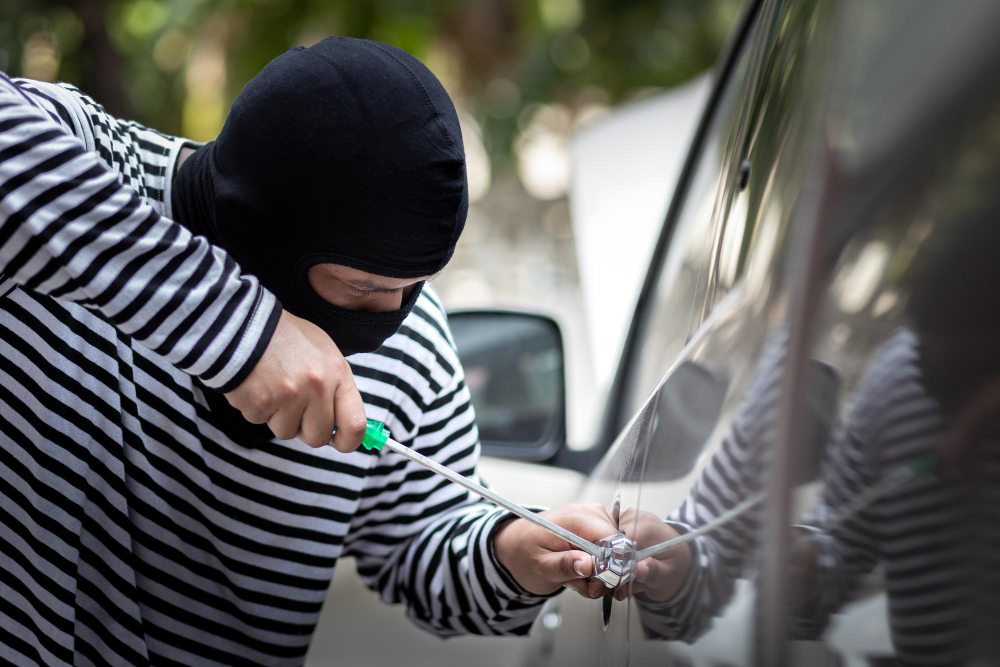How To Prevent Your Car From Getting Stolen
- 1 How To Prevent Car Theft?
- 1.1 1. Park In Safe Areas
- 1.2 2. Use Anti-Theft Devices
- 1.3 3. Install A Car Tracking System
- 1.4 4. Keep Valuables Out Of Sight
- 1.5 5. Don’t Leave Spare Keys In The Car
- 1.6 6. Use A Steering Wheel Lock
- 1.7 7. Consider Installing Car Alarm
- 2 What To Do If Your Car Gets Stolen?
- 3 Frequently Asked Questions
- Prevention Measures: Implement anti-theft systems like car alarms, steering wheel locks, and GPS trackers to deter thieves.
- Safe Parking: Park in well-lit areas, secure garages, or monitored spaces to reduce the risk of theft.
- Immediate Action: If your car is stolen, contact the police, notify your insurance company, and file a stolen vehicle report promptly to aid in recovery efforts.
Car theft is a significant concern, according to the National Highway Traffic Safety Administration (NHTSA), prompting the need for effective car theft prevention measures and anti-theft systems. The aftermath of a car theft can be distressing. It leads to financial loss and inconvenience for individuals and has broader implications for community safety and security. Car theft can increase insurance premiums and have a ripple effect on the local economy.
In this article, we will explore the practical steps you can take to prevent car theft. Implementing anti-theft systems is crucial in deterring thieves and protecting individual vehicle owners and the community. When effective measures are in place, they act as a deterrent, reducing the occurrence of car theft and providing peace of mind to car owners.
How To Prevent Car Theft?
Preventing car theft requires effective anti-theft systems and security measures, including driveway and garage security, steering wheel locks, and heightened vigilance in high-crime areas. Anti-theft systems such as car alarms, immobilizers, and GPS tracking devices are strong deterrents against car theft. Installing motion-activated lights and security cameras in the driveway and garage adds an extra layer of protection. Using a visible steering wheel lock can deter potential thieves by making the vehicle less appealing as a target. When parking in high crime areas, observing the surroundings and avoiding leaving valuables in plain sight is crucial, which can attract thieves.
1. Park In Safe Areas
Parking in safe areas, such as well-lit driveways, secured garages, and monitored parking spaces in high-crime areas, can significantly reduce the risk of car theft. Well-lit driveways not only enhance visibility but also act as a deterrent for potential thieves. Secured garages provide an added layer of protection, shielding vehicles from unauthorized access. Monitored parking spaces in high crime areas offer peace of mind, with surveillance and security measures in place to ensure the safety of parked vehicles.
2. Use Anti-Theft Devices
Utilizing anti-theft devices such as remote car starters, kill switches, power locks, and VIN windows can fortify the security of vehicles and deter potential car thieves. Remote car starters allow you to start your car from a distance, ensuring interior comfort before entering. Kill switches, on the other hand, disrupt the flow of electricity or fuel, effectively preventing the engine from starting without proper authorization.
Power locks offer additional protection by securing the vehicle’s doors, making it harder for intruders to gain access. Furthermore, VIN windows etch the vehicle identification number onto the windows, acting as a visual deterrent and making it more difficult for thieves to sell stolen parts.
3. Install A Car Tracking System
With technological advancement, Car GPS trackers have become a critical tool for vehicle security. These devices offer real-time location tracking, enabling owners to monitor their vehicles’ whereabouts at all times. In the unfortunate event of theft, the GPS tracker can provide law enforcement with precise location data, increasing the chances of recovering the stolen vehicle. It acts as a deterrent for potential thieves, minimizing the risk of car theft.
The peace of mind that comes with knowing the vehicle’s location can be invaluable, especially for those living in high-theft areas.
4. Keep Valuables Out Of Sight
When valuable possessions are left within plain view, it becomes an open invitation for theft. By concealing electronics, bags, and wallets, drivers can actively deter potential criminals from targeting their vehicles. Typically, burglars look for quick, lucrative opportunities; by eliminating the temptation, drivers can significantly reduce the risk of falling prey to theft or vandalism. This practice secures the belongings and contributes to overall vehicle safety and crime prevention.
5. Don’t Leave Spare Keys In The Car
Leaving spare keys in your vehicle can provide potential thieves with easy access. It’s essential to be vigilant and keep extra keys secure. If there is a stolen vehicle, promptly filing a report with law enforcement is critical. This can aid in the recovery of the car and prevent further criminal activity. Taking proactive measures and not leaving spare keys in your vehicle can significantly reduce the chances of unauthorized access and theft.
6. Use A Steering Wheel Lock
Steering wheel locks are designed to make it extremely difficult for potential thieves to operate the steering wheel, impeding their efforts to drive away with the vehicle. This visible deterrent creates a formidable barrier, dissuading opportunistic criminals from targeting the car. The physical presence of a steering wheel lock can act as a powerful visual cue to potential thieves, signalling that the vehicle is well-protected and not an easy target.
7. Consider Installing Car Alarm
Installing a smart car alarm can enhance the security of vehicles by providing active deterrence against car thieves and carjackers, alerting owners and law enforcement to potential unauthorized access and theft attempts.
These advanced car alarm systems come equipped with motion sensors, glass break detectors, and immobilizers that add multiple layers of protection against theft. The real-time notifications and alerts sent to a smartphone app or connected smart device ensure that owners can take immediate action in case of an intrusion. Smart car alarms often work with GPS tracking technology, enabling the authorities to locate and recover stolen vehicles swiftly, minimizing irreparable damage or loss.
What To Do If Your Car Gets Stolen?
In the unfortunate event of car theft, it is crucial to promptly contact the police, notify your insurance company, and file a stolen vehicle report to initiate the recovery and investigation.
When your vehicle is stolen, reaching out to the authorities as soon as possible is essential for increasing the chances of recovering your vehicle. It is vital to provide the police with as many details about the theft as you can recall, including the make, model, colour, and distinct car features. Promptly notifying your insurance company about the theft helps start the claim process and ensure that you comply with the policy requirements.
- Once you have reported the theft to the police and your insurance company, filing a stolen vehicle report is imperative. This report formalizes the robbery, which can aid in locating the vehicle and preventing potential misuse.
- Staying updated on any progress made in the investigation by regularly communicating with the police and your insurance company is crucial. Providing them with any additional information or leads can significantly aid in the search for your stolen car.
In the unfortunate event of car theft, it is crucial to promptly contact the police, notify your insurance company, and file a stolen vehicle report to initiate the recovery and investigation.
When your vehicle is stolen, reaching out to the authorities as soon as possible is essential for increasing the chances of recovering your vehicle. It is vital to provide the police with as many details about the theft as you can recall, including the make, model, colour, and distinct car features. Promptly notifying your insurance company about the theft helps start the claim process and ensure that you comply with the policy requirements.
- Once you have reported the theft to the police and your insurance company, filing a stolen vehicle report is imperative. This report formalizes the robbery, which can aid in locating the vehicle and preventing potential misuse.
- Staying updated on any progress made in the investigation by regularly communicating with the police and your insurance company is crucial. Providing them with any additional information or leads can significantly aid in the search for your stolen car.
Frequently Asked Questions
How can I prevent my car from getting stolen?
To prevent your car from getting stolen, there are a few simple steps you can follow:
- Use an anti-theft device such as a steering wheel lock or alarm system.
- Park in well-lit and busy areas to deter thieves.
- Keep your car’s registration and insurance documents with you instead of leaving them in the car.
- If possible, install a GPS tracking system on your car to help locate it if it does get stolen.
What should I do if my car is stolen?
If your car is stolen, you should take the following steps:
- Call the police and report the theft immediately.
- Provide the police with all the necessary details such as the make, model, and license plate number of your car.
- Contact your insurance company and file a claim.
- Check with local tow companies and impound lots in case your car was towed.
- Keep track of any surveillance footage or witness testimonies that may help in recovering your car.
- Stay calm and avoid taking matters into your own hands.
Is it necessary to have comprehensive car insurance to prevent theft?
No, comprehensive car insurance is not necessary to prevent theft, but it can help cover the cost of damages or loss in case your car is stolen. It is always recommended to have comprehensive insurance for added protection and peace of mind.
What are some common mistakes that can lead to car theft?
Some common mistakes that can make your car an easy target for thieves include:
- Leaving your keys in the car or hiding a spare key somewhere on the exterior.
- Leaving valuable items visible in the car, such as a GPS or phone.
- Parking in remote or poorly lit areas.
- Not properly securing your car, such as leaving windows or sunroofs open.
- Leaving your car running and unattended.


















